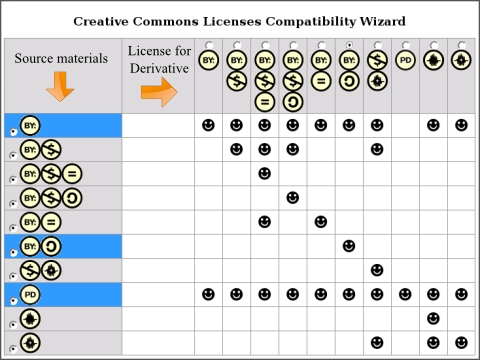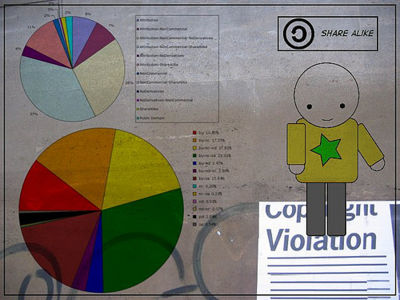License Compatibility
| [▲]OER Handbook for Educators | |
|---|---|
| License | Copyright Clearance | License Compatibility | Creative Commons | Adding a Creative Commons License | GFDL | Which License Should I Choose? | Perspectives |
It seems only natural to assume that an OER with a Creative Commons license could be mixed with an OER with a different license. Unfortunately, this is not the case. Some licenses are incompatible with others. Probably the most prominent example is Wikipedia, which uses the GNU Free Documentation License, not being compatible with, say, WikiEducator, which uses Creative Commons Attribution-ShareAlike. Although the licenses are similar in intent, they are not compatible; meaning you cannot take Wikipedia material and mix it with material from WikiEducator or other sources (e.g. blogs) that are licensed with a Creative Commons license. This is because of the requirement that derivative works are released under exactly the same license as the source materials. However, it is possible to release a derivative work under a dual license, particularly where the sub-sections can be identified as discrete parts. In other words, parts of the material could be licensed with Creative Commons and part GFDL, provided the different sections are clearly defined and marked.
Because of the many different types of licenses available, and all the possible combinations, it is difficult to explain every possible license incompatibility. However, the following is a compatibility chart for licenses within the Creative Commons suite (boxes without a "smiley" face indicate incompatibility) (Wiley, 2007; Creative Commons, n.d.).

If I license incorrectly am I going to be sued?
The short answer is: possibly.
The long answer is: You should do your best to understand the terms of the license under which you use an OER. The most common ways you might violate the terms of a license are:
- Making commercial or for-profit use of an OER whose license includes the Non-commerical (NC) clause
- Making derivative works from an OER whose license includes the No-Derivatives (ND) clause
- Failing to share derivatives of an OER, whose license includes the Share-Alike (SA) clause, under the same license.
If you do your best to understand the license and are acting in good faith, it is unlikely that you will face immediate legal action for violating the terms of an OER license. Common practice in the open education community is for a rights holder to notify a violator that their actions are inappropriate and request that they make necessary changes. If you receive this sort of notice and refuse to comply, you greatly increase your chances of being sued.[1]
This license thing seems really complicated, is this all really necessary?
As people learn more about OER, the idea of license incompatibility can scare them. You should keep in mind that traditional copyright is not straightforward either (see Cornell's copyright table[2] as an example).
For some, licensing represents an important part of who they are in the OER community as well as their philosophy about OER. Arguably, the OER community has spent too much time arguing about licenses. While having so many licenses may seem redundant and wasteful, it is actually a reflection of the freedoms of OER. In other words, everyone sees OER a little differently and that is why there are so many licenses. The good news is that the organizations behind these licenses are starting to keep license incompatibility in mind as they develop future versions of their licenses. For example, both Creative Commons, Wikimedia Foundation, and the Free Software Foundation are working to make Creative Commons licenses compatible with the GFDL (Wikimedia Foundation Inc., 2007).
What should I do?
Pay attention to the licenses of the material you are using and obey by the terms of those licenses, especially Non-commercial, No Derivatives, and Share Alike. As you're combining material, ask yourself: Is there anything that this license requires that doesn't work with the requirements of my other material? If the answer is "yes," then it is best to not to use that material. One option is to contact the copyright holder and ask whether or not the use is incompatible. The copyright holder may or may not be sure either, but the copyright holder is the most important person to talk to in that type of situation. Another option is to contact others in the OER community to answer your questions (see OER Forums in the Conclusion).
If you cannot contact the copyright holder, and are still uncertain about the use, use your best judgment. Depending on your level of concern about liability, you may want to consider foregoing the mixing of the two resources entirely.
The purpose of this section is not to scare you away from creating OER, but to make you aware of an area of concern when creating OER. In some ways, OER incompatibility is more a matter of theory than it is a problem in practice. Nevertheless, you should always abide by the license clauses of material that you use.
Notes
- Jump up ↑ This information should not be construed as legal advice; for legal advice you should seek the counsel of an appropriately licensed individual or firm.
- Jump up ↑ http://www.copyright.cornell.edu/public_domain/
Sources
Creative Commons. (n.d.). Creative Commons Licensing Compatibility. Retrieved March 25, 2008, from http://creativecommons.org.tw/licwiz/english.html
Lessig, L. (2005, November 30). CC in Review: Lawrence Lessig on Compatibility. Retrieved March 21, 2008, from http://creativecommons.org/weblog/entry/5709
Wiley, D. (2007). Noncommercial Isn’t the Problem, ShareAlike Is. Iterating Towards Openness. Retrieved March 21, 2008, from http://opencontent.org/blog/archives/347
Wikimedia Foundation, Inc. (2007, December 1). Resolution:License update. Retrieved March 25, 2008, from http://wikimediafoundation.org/wiki/Resolution:License_update
